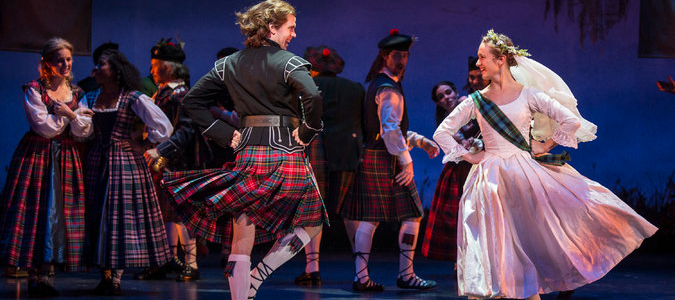

Brigadoon (Chicago)
Opening Night: June 27, 2014
Closing: August 17, 2014
Theater: Goodman Theatre
When American tourists Tommy and Jeff get lost on vacation in Scotland they stumble into Brigadoon, a mythical village that appears for only one day every 100 years. No outsider can stay in Brigadoon unless they fall in love, and no resident can ever leave or the village will vanish forever. But when Tommy falls for a village girl, he is forced to choose between returning to the world that he knows—or taking a chance on life and love in the mysterious Brigadoon. Big, beautiful and beguiling, Brigadoon is a “ravishing” (The New Yorker) musical delight that will sweep you off your feet.
BUY TICKETSREAD THE REVIEWS:
July 7, 2014
In certain, more cynical parts of Scotland, the term Brigadoonery applies to the cultivation of over-the-top stereotypes of Scotland that long have filled north-of-the-border purses from Edinburgh Airport to St. Andrews Links to the environs of the Brig o’ Doon, the real Ayrshire bridge that’s on the Robbie Burns tourist trail and from which Alan J. Lerner and Frederick Loewe likely found the title of their richly scored Broadway musical in 1947. Today’s Scots roll their eyes at tartan pants, ample ochs, frequent ayes, swigs of scotch and the pop of golf balls, and, of course, an abundance of bonnie lassies all roamin’ in the gloamin’, their kilted paramours pricking themselves in the pesky heather. That’s all mostly tourist fodder to a newly determined Scotland wherein a good chunk of the citizenry may soon cast its ballot for independence. One aim of director Rachel Rockwell’s new, revisionist production of Brigadoon, which opened Monday night at the Goodman Theatre with a revised book by Brian Hill, as officially sanctioned by the Lerner estate, is to rescue Brigadoon, famous for its score for the past 67 years, from any and all such Brigadoonery. There is partly a practical aim behind the project: to juice the sagging interest in a show that is generally regarded in musical-theater circles as featuring a wonderful, American songbook-rich score (“The Heather on the Hill,” “Almost Like Being in Love”) stuck inside a creaking book that imagines two well-heeled, postwar American travelers in Scotland who encounter a mystical village that only appears for one day every 100 years. One of the interlopers, Tommy Albright (played by Kevin Earley) is inconveniently engaged to a stateside woman he’d really rather not marry — complications ensue when he meets Fiona (Jennie Sophia), a Scottish lassie who appears to have been born in the 18th century but who is aging very nicely indeed. If you catch her on her one good day.
READ THE REVIEWJuly 7, 2014
Rodgers and Hammerstein’s Oklahoma arrived on Broadway in 1943, in the midst of World War II, and served as a rousing endorsement of America’s pioneering spirit and optimism. Lerner and Loewe’s Brigadoon debuted in 1947, just two years after the war had ended. Listen closely to the rare and radiant Goodman Theatre revival of the musical that has been so fluidly directed and choreographed by Rachel Rockwell, and you will sense something less than triumphalism. Tommy Albright (Kevin Earley), the young New Yorker who has returned from the war and is about to marry a wealthy socialite, is sick at heart. As Fiona MacLaren (Jennie Sophia), the perceptive woman he meets and falls in love with during a pre-wedding trip to the Scottish Highlands, observes, something in his soul seems to be lost. As it happens, the inhabitants of the Scottish town of Brigadoon had their own harrowing experience with war two centuries earlier. And they are still paying the price by living under a protective spell that, since 1746, has allowed them to come to life for only one day every 100 years. Brigadoon is a tragicomic romantic fairy tale full of real-life echoes. But mostly it is a vintage beauty — awash in gorgeous songs performed by a cast with heavenly voices, lush orchestrations, an exquisite blend of traditional Scottish dance and balletic storytelling, and a set that is a clever mix of old and new stagecraft. To be sure, it is a far cry from such contemporary shows as The Book of Mormon and Jersey Boys. And that might just be the secret of its charm.
READ THE REVIEWJuly 9, 2014
In 1943, the Rodgers and Hammerstein musical Oklahoma! stirred audiences with its youthful optimism, glorifying a hero who was willing to fight for the woman and the land he loved. “Oh, what a beautiful morning,” the singing cowboy crooned—just what Americans needed to hear at the peak of World War II. But after the war—as people began to comprehend the horrors of the Holocaust, the devastation of Europe’s great cities, and the atomic bombing of Hiroshima and Nagasaki—earthy hopefulness gave way to anxious uncertainty about the meaning of life and the precariousness of human existence, prompting a vogue for tales in which magic and miracles provided a sense of hope. In the 1946 film It’s a Wonderful Life, a man is saved from suicide by a guardian angel. And the despairing protagonist of Rodgers and Hammerstein’s 1945 Carousel actually does commit suicide; a heavenly Starkeeper gives him a chance to return to earth to set things right for the family he left behind.
READ THE REVIEWJuly 8, 2014
A few days ago, a friend and I were joking about the plot of Lerner and Loewe’s Brigadoon when he quipped, “What a silly story,” then, quickly realizing what he was saying in the same thought, he added “unlike most musicals.” Exactly. The tale of a mystical town in the Scottish Highlands that only appears for one day every hundred years is hardly an outlier in a world of singing and dancing cats or workingmen who build big ships not for money but for metaphor. But it is quaint, with its midcentury notions of utopianism grounded in a rustic, rural time capsule. And it is strange, its peculiarities foregrounded in director Rachel Rockwell’s stunning Goodman debut. But its strangeness holds its charm for me, with the town of “Brigadoon” as a stand-in for a particular vision of heaven, and the incursion of us Americans resembling the Fall From Grace in the Garden of Eden. (Other things I found swirling around in my brain in some of the slower parts, which this imperfect work has, included the even-sillier “Gilligan’s Island,” with its comic—as opposed to tragic here—explorations of the challenges of mating in a small-sample population without mobility, and the musical Riverdance, which I admittedly only know through the incessant television commercials that once ran. Rockwell’s lords of the dance, though, are Scottish, not Irish, with tartan kilts, bagpipes and Highland dancing, which she blends deftly with ballet, leading to some mesmerizing choreography, most notably in the festive “I’ll Go Home with Bonnie Jean.”)
READ THE REVIEWJuly 7, 2014
The village in the Scottish Highlands for which Lerner and Loewe’s 1947 musical is named is, as kindly town leader Mr. Lundie (Roger Mueller) puts it, a miracle: Thanks to the fervent prayers and personal sacrifice of a beloved minister who worried over the bloody clashes of 18th-century Scotland, Brigadoon escaped from time. Now it appears just one day every 100 years; for Brigadoon’s residents, just two days have passed when two American tourists, World War II veterans Tommy Albright (Kevin Earley) and Jeff Douglas (Rod Thomas) stumble upon it in 1946 on a hunting trip. The outsiders are warily welcomed by the townspeople, who are preparing to celebrate the wedding of Jean MacLaren (Olivia Renteria) and Charlie Dalrymple (Jordan Brown). But it’s Jean’s single sister, Fiona (Jennie Sophia), who catches Tommy’s eye—a problem both because he’s about to get married back home to a woman he’s not sure he really loves, and because of the whole existing-one-day-a-century thing. Brigadoon the musical seems to reappear in Chicago more like once a decade (it’s been seen in 1996 at the Candlelight Dinner Playhouse, 2005 at the Marriott Theatre and three years ago at Light Opera Works), but what most distinguishes the Goodman’s new production is its revisions in two key areas. Though Frederick Loewe’s lushly romantic score holds up gorgeously, Alan Jay Lerner’s book—written from scratch, rather than adapted from another source, like Rodgers and Hammerstein’s Oklahoma! or Lerner and Loewe’s later My Fair Lady—is often pegged in modern productions as corny and dated. The Lerner estate encouraged director Rachel Rockwell and writer Brian Hill to freshen up the book. And unlike most revivals which tend to attempt faithful recreations of Agnes de Mille’s original choreography, Rockwell has created entirely new dances.
READ THE REVIEWJuly 14, 2014
Brigadoon, the musical about a Scottish town that lives for a day only to disappear for a century, may be in danger of achieving a similar evanescence. Although it was the first hit show from one of the American musical theater’s most successful teams — Alan Jay Lerner and Frederick Loewe, who went on to write My Fair Lady and Camelot — this early romantic fantasy has faded to the fringes of the repertoire, and has not been seen on Broadway since 1981. At the Goodman Theater here, the musical has been given a first-class revival that boasts an infectious buoyancy of spirit and a welcome absence of postmodern flourishes. It’s almost like being back in 1947, when the show opened to become one of the most beloved musicals of the era. (It was filmed in 1954, with Gene Kelly and Cyd Charisse.) The kilts flap and fly, the bagpipes pipe away, and rapturous music, including the show’s signature song, “Almost Like Being in Love,” flows forth from start to finish. Most gratifyingly, the production makes you feel that the director and choreographer, Rachel Rockwell, loves this musical as dearly and sincerely as any other, and feels no need to offer any blushing apology for its deep-dyed romanticism. It would not be easy to do much radical tinkering with Brigadoon in any case, although the book has been revised by Brian Hill. The Scottish atmosphere that some may regard as rib-ticklingly kitschy is inextricably woven into the music and the story line, lying as thickly over the proceedings as the mist that shrouds the town of Brigadoon when two American hunters lost in the highlands stumble upon it during the one day in the 20th century that it springs back to life. (The story behind the town’s peculiar fate has been changed in Mr. Hill’s version, to emphasize the 18th-century strife in Scotland that the people of Brigadoon sought to escape when the village first did its disappearing act.)
READ THE REVIEW




















